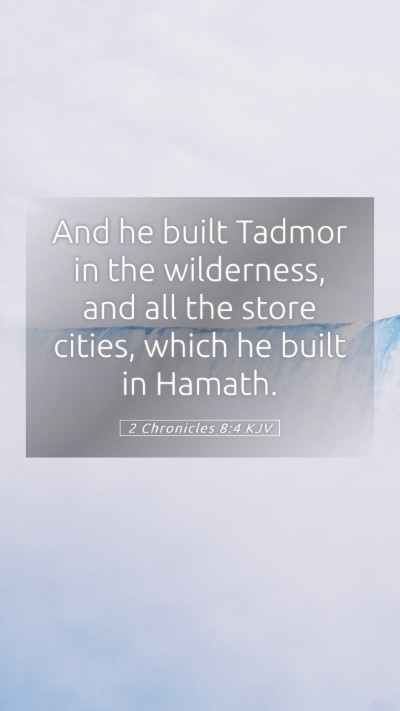Understanding 2 Chronicles 8:4
Bible Verse: 2 Chronicles 8:4 - "And he built {up} Tadmor in the wilderness, and all the store cities, which he built in Hamath."
Overview
The verse recounts a significant achievement of King Solomon as he expands his kingdom through infrastructure development. This specific reference highlights his ability to build cities that not only serve military purposes but also contribute to economic prosperity through trade and agriculture.
Commentary Insights
-
Matthew Henry:
Henry emphasizes the grandeur of Solomon’s accomplishments, noting that the construction of Tadmor (or Palmyra) in the wilderness was indicative of the king's vast resources and strategic wisdom in fortifying his realm. He observes that these endeavors not only increased Solomon's wealth but also made Israel more powerful in terms of trade routes.
-
Albert Barnes:
Barnes elaborates on the significance of the “store cities” mentioned in the verse, interpreting them as essential economic hubs that facilitated trade and storage of goods. He discusses the historical context of Hamath as a strategic location that allowed Solomon to exert influence over trade routes and defend against potential enemies.
-
Adam Clarke:
Clarke provides an interpretation of the wilderness as both a literal and symbolic space. He sees the building of cities in uninhabitable areas as reflecting divine favor, demonstrating that God can transform desolate places into fruitful regions through righteous leadership. Clarke also notes the historical implications of this city-building for the overall stability of Solomon’s kingdom.
Biblical Context
In the broader context of 2 Chronicles, this passage highlights the reign of Solomon known for wisdom and prosperity. The book portrays a narrative that illustrates the fulfillment of God’s promises to David regarding his lineage and the establishment of a prosperous Israel under Solomon.
Application and Relevance
For modern readers and Bible study groups, 2 Chronicles 8:4 serves as a reminder of the importance of leadership in infrastructure and economic development. It encapsulates the belief that wise governance can lead to the flourishing of communities. This verse encourages believers to reflect on their roles as stewards of resources, leveraging their strengths to build up their communities.
Cross References
- 1 Kings 9:18 - "And Baalath and all the store cities that Solomon had, and all the cities of the chariots, and the cities of the horsemen, and all that Solomon desired to build in Jerusalem, and in Lebanon, and in all the land of his dominion."
- 2 Chronicles 7:11 - "Thus Solomon finished the house of the Lord, and the king's house: and all that came into Solomon's heart to make in the house of the Lord, and in his own house, he prosperously effected."
- 2 Chronicles 9:1-2 - "And when the queen of Sheba heard of the fame of Solomon, she came to prove Solomon with hard questions. And she came to Jerusalem with a very great train, with camels that bare spices, and gold in abundance, and precious stones: and when she was come to Solomon, she communed with him of all that was in her heart."
Conclusion
In summary, 2 Chronicles 8:4 offers rich biblical insights regarding leadership, prosperity, and the importance of infrastructure development in building strong communities. Through this analysis, readers gain a deeper understanding of Scripture, learning how to apply these lessons in their lives today. The commentary by Henry, Barnes, and Clarke collectively enhances our comprehension of this significant verse within the context of biblical narrative and God's promises.


